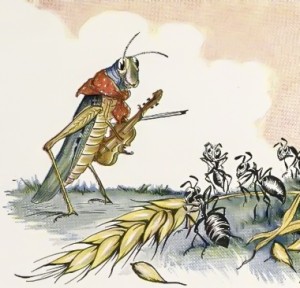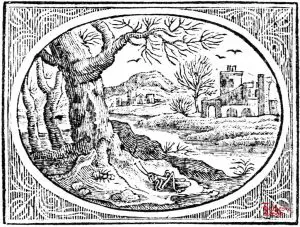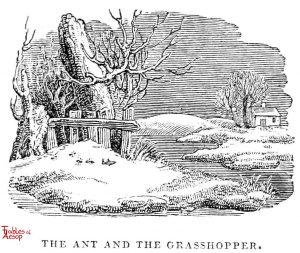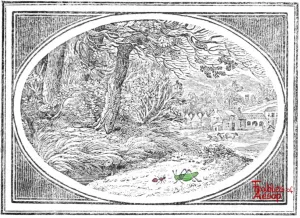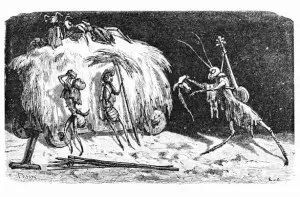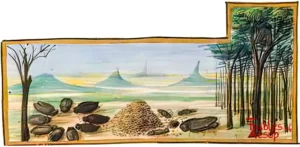A Grasshopper frolicked while an Ant stored food for the winter. When winter came the Ant was comfortable; the Grasshopper not so.
Prepare for the future.

Aesop For Children
One bright day in late autumn a family of Ants were bustling about in the warm sunshine, drying out the grain they had stored up during the summer, when a starving Grasshopper, his fiddle under his arm, came up and humbly begged for a bite to eat.
“What!” cried the Ants in surprise, “haven’t you stored anything away for the winter? What in the world were you doing all last summer?”
“I didn’t have time to store up any food,” whined the Grasshopper; “I was so busy making music that before I knew it the summer was gone.”
The Ants shrugged their shoulders in disgust.
“Making music, were you?” they cried. “Very well; now dance!” And they turned their backs on the Grasshopper and went on with their work.
Moral
There’s a time for work and a time for play.

Samuel Croxall
IN the winter season a commonwealth of Ants was busily employed in the management and preservation of their corn; which they exposed to the air, in heaps, round about the avenues of their little country habitation. A Grasshopper, who had chanced to outlive the summer, and was ready to starve with cold and hunger, approached them with great humility, and begged that they would relieve his necessity, with one grain of wheat or rye. One of the ants asked him, how he had disposed of his time in summer, that he had not taken pains, and laid in a stock, as they had done. Alas, Gentlemen, says he, I passed away the time merrily and pleasantly, in drinking, singing, and dancing, and never once thought of winter. If that be the case, replied the Ant, laughing, all I have to say is, That they who drink, sing, and dance in the summer, must starve in the winter.
THE APPLICATION
As summer is the season of the year in which the industrious and laborious husbandman gathers and lays up such fruits as may supply his necessities in winter, so youth and manhood are the times of lift; which we should employ and bestow inlaying in such a stock of all kinds of necessaries, as may suffice for the craving demands of helpless old age. Yet, notwithstanding the truth of this, there are mauy of those which we call rational creatures, who live in a method quite opposite to it, and make it their business to squander away, in a profuse prodigality, whatever they get in their younger days: as if the infirmity of age would require no supplies to support it; or, at least, would find them administered to it in some miraculous way. From this fable we learn this admirable lesson, never to lose any present opportunity of providing against the future evils and accidents of life. While health, and the flower and vigour of our age remain firm and entire, let us lay them out to the best advantage; that, when the latter days take hold of us, and spoil us of our strength and abilities, we may have a store moderately sufficient to subsist upon, which we laid up in the morning of our age.

Thomas Bewick (The Ant and The Grasshopper)
A commonwealth of Ants, having, after a busy summer, provided every thing for their wants in the winter, were about shutting themselves up for that dreary season, when a Grasshopper in great distress, and in dread of perishing with cold and hunger, approached their avenues, and with great humility begged they would relieve his wants, and permit him to take shelter in any corner of their comfortable mansion. One of the Ants asked him how he had disposed of his time in summer, that he had not taken pains and laid in a stock, as they had done? Alas! my friends, says he, I passed away the time merrily and pleasantly, in drinking, singing, and dancing, and never once thought of winter. It that be the case, replied the Ant, all I have to say is this: that they who drink, sing, and dance in the summer, run a great risk of starving in the winter.
APPLICATION.
As summer is the season in which the industrious laborious husbandman lays up his supplies for the winter, so youth and manhood are the times of life which we should employ in laying in such a stock as may suffice for helpless old age; yet there are many whom we call rational creatures, who squander away in a profuse prodigality, whatever they get in their younger days, as if the infirmity of age would require no supplies to support it, or at least would find them administered to it in some miraculous way. From this Fable we learn this admirable lesson, never to lose the present opportunity of fairly and honestly providing against the future evils and accidents of life; and while health and the vigour of our faculties remain firm and entire, to lay them out to the best advantage; so that when age and infirmities despoil us of our strength and abilities, we may not have to bewail that we have neglected to provide for the wants of our latter days: for it should always be remembered, that “a youth of revels breeds an age of care,” and that temperance in youth lays the foundation of health and comfort for old age.
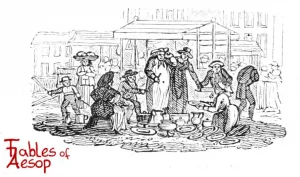

Eliot/Jacobs Version
One summer’s day a Grasshopper was hopping about, chirping and singing to its heart’s content. An Ant passed by, bearing an ear of corn he was taking to the nest.
“Why not come and chat with me,” said the Grasshopper, “instead of toiling in that way?”
“I am helping to lay up food for the winter,” said the Ant, “and recommend you do the same.”
“Why bother about winter?” said the Grasshopper; “we have plenty of food now.”
The Ant went on its way. When winter came the Grasshopper had no food and found itself dying of hunger, while it saw the ants distributing corn and grain from the stores they had collected in the summer.

JBR Collection
A Grasshopper that had merrily sung all the summer, was almost perishing with hunger in the winter. So she went to some Ants that lived near, and asked them to lend her a little of the food they had put by.” You shall certainly be paid before this time of year comes again,” said she. “What did you do all the summer?” asked they. “Why, all day long, and all night long too, I sang, if you please,” answered the Grasshopper. “Oh, you sang, did you?” said the Ants. “Now, then, you can dance.”

Townsend version
The ants were spending a fine winter’s day drying grain collected in the summertime. A Grasshopper, perishing with famine, passed by and earnestly begged for a little food. The Ants inquired of him, “Why did you not treasure up food during the summer?” He replied, “I had not leisure enough. I passed the days in singing.” They then said in derision: “If you were foolish enough to sing all the summer, you must dance supperless to bed in the winter.”

Gherardo Image from 1480

Formicae et Cicada
Formicae fruges per hiemem humectatas siccabant. Has adit cicada, esuriens, et rogat paululum cibi ut sibi impertiant. Cui illae, “Aestate,” inquiunt, “quaerere te oportuit.” “Non vacabat,” inquit cicada. “Quid faciebas igitur?” “Cantationibus operam dabam,” inquit. Tum illae, “Si cecinisti,” inquiunt, “aestate, hieme saltato.”
Perry #373
